All Forum Posts by: Brett P Swarts
Brett P Swarts has started 214 posts and replied 252 times.
 Post: The Blockbuster Versus Netflix Secret of the Deferred Sales Trust
Post: The Blockbuster Versus Netflix Secret of the Deferred Sales Trust
- Specialist
- SAINT AUGUSTINE
- Posts 261
- Votes 26
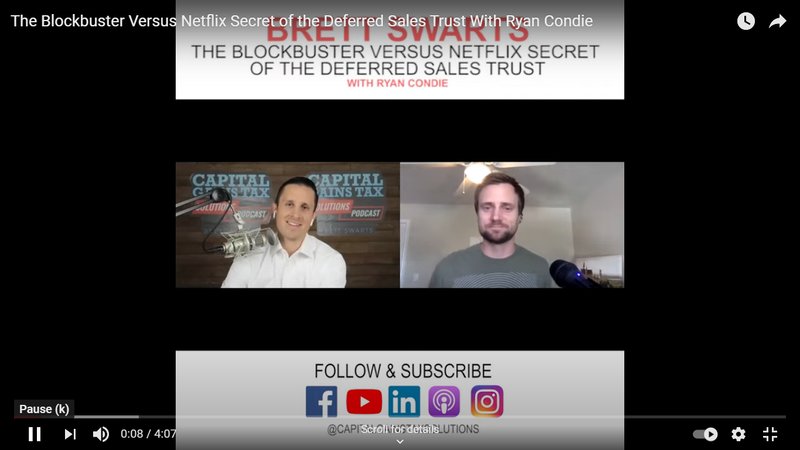
Ryan Condie:
So essentially what you're telling me is, you can structure the same thing. But then you could do it with all the cash upfront. So you don't have any of the liability of like, I'm not going to get paid five years from now.
Brett Swarts:
You got it right. And we call this the blockbuster versus Netflix secret of the Deferred Sales Trust. Okay, so do you ever go to blockbuster in the days, Ryan, where you show up on a Friday night, and you're excited about that movie, but so are probably three or four other people who just parked in the parking lot. And it depends on who gets in there first, because that, you know, that stack of movies that's behind that cardboard is slowly going smaller. But you see that movie, right? And you know, it's there, and you're waking up, grab that same movie, they look at you, and they smile, and you guys are like, everyone wanted that movie? Well, even if you got that movie, right? It's about me, you lost it, but you have three days to return it, you have to rewind it if you don't rewind, you're gonna get a penalty, you're late fee. You know, it's just kind of an old way of doing things, right? Well, that's sort of like the traditional installment sale or the 1031 exchange, right? It's called the transactional type of wealth plan or deal planning, right? And that it's restrictive. Typically, a seller’s carryback is short in nature, meaning it's three to five years, and they haven't really typically no prepayment penalties. And so yeah, you get some tax deferral for a few years, but then they're gonna pay it all, and then you're out versus the Netflix which is the Deferred Sales Trust way of doing things you can go for as long as you want, these notes can go for 10 years, you can renew for 10, 10,10 keep going past to your kids.
So essentially, you can go for as long as you want on this one. The other one, you're tied to that one single person, that's a good point you bring up, you're not diversified, you might have to take back that business, which could be I mean, you're selling the business, you don't want to have the threat or the thought of having to take it back in case that person doesn't pay you. So you're not diversified, you're counting on one person to pay you. Whereas this one, you can actually the collateral is tied to some of the biggest companies in the world, you can put it with Apple, Netflix, Google, you know, a Costco, you can put into real estate venture of your own or with partners or new business venture. And in other words, you can diversify that 2.6 million over here, versus carrying it back for one single person, right? So that's much more powerful.
The next one is liquidity, right? You might need money, but this person is like what the business isn't doing so well. I can't pay you back right away. And this scenario, you can pull off the cash whenever you want, just pay the tax. So you have liquidity, diversification, longevity. And the last one is optimal timing. You know how Netflix you can just sit there and just rent a movie, I mean, or just click on moving on to rent it right you just click and it's there. It's never sold out. There's never returned for you don't have to drive on a Friday night in the rain or the snow if you're in Salt Lake right? And try to park to go get it right. It's the way, it's a Netflix way of doing things. It's just a lot of people are still stuck in the blockbuster way of doing things. And the other little nuance here is if you are buying a business from somebody, and especially if it's a good business, they don't necessarily want to give you seller financing right they say come with your cash, right and even if you're getting SBA financing, you may not even want their terms anyway, right? You want to even a lower down payment you want SBA financing, which is phenomenal right now with rates and gives them a chance to cash out. And so if you approach them with a tax deferral strategy to say, hey, look, you were going to pay me a sell it for 3 million. I'll buy it for 2.8 you were gonna pay a million in tax anyways. But I want you to talk to Ryan and Luke will connect with Brett and they will help you save a million dollars. Would you save it? Would you save me $200,000? So there's a number of ways to skin the cap but the key is how are you adding value as you're approaching to buy these businesses versus everybody else? right if you're just competing on price, you only have to pay a little bit higher. But if you're helping them with terms and with planning, wow you to create what's called a transformational wealth plan which is what the Deferred Sales Trust does, versus just a transactional wealth plan which is what the old seller carry back does, if that makes sense.
Learn more about Deferred Sales Trust
Visit: www.capitalgainstaxsolutions.com
 Post: How Brett Got Started Investing in Real Estate
Post: How Brett Got Started Investing in Real Estate
- Specialist
- SAINT AUGUSTINE
- Posts 261
- Votes 26
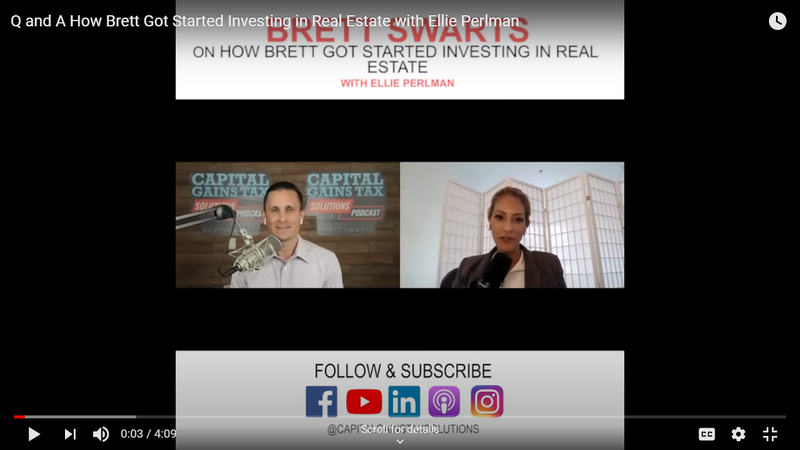
Ellie Perlman:
Brett, can you tell me a little bit more about yourself and how you got started investing in real estate?
Brett Swarts:
Yeah, originally growing up in the Bay Area, and San Jose Fremont, kind of Silicon Valley, I learned the sticks and bricks of real estate. And at a young age, my dad was a real estate developer, owner, and contractor building big homes in the Mission Hills area. So I fell in love with rentals and cash flow and being an entrepreneur, and learn how to really work hard. And from there, I went to school and studied business, as well as Bible and theology, and a minor in counseling psychology, but it took an internship at a company called Marcus and Millichap, where we help people buy and sell multifamily properties. Mainly, that was my focus in the niche, but it wasn't always easy, it's 2006. And things were going pretty well. And I was brand new in the business just trying to make it trying to survive, and my wife's at home and our first baby is on the way and, so we just started to get some momentum. And for those who don't know, in real estate brokerage, it's 100%, sinker swept, no salary, no benefits. I grew up with, my dad who had a lot of wealth, mom didn't. Parents were divorced when I was young. And I always knew that I didn't want finances to be any kind of struggle, and I want it to be the dad to be able to provide for the family. And I want to take that pressure off the table. And so I wanted to make it big in real estate. And I was determined to succeed. And just as I started to get some momentum, the 2008 crash hit, and it felt like a brick wall, and for your listeners is whoever been so scared and aren't sure what's going to do to support your family? Or how are you going to make it but you had a dream and you wanted to keep it alive? What do you do what every good entrepreneur does, and you get a side job. So I worked the side job at Cheesecake Factory, my wife and I's favorite restaurant. And I worked there nights and weekends. And by day I would make real estate calls and try to help my clients who are losing their properties to banks, who are trying to reassess taxes with banks or without with the city and counties. And we're trying to hold on to these tenants who were all of a sudden didn't have jobs, right. And so with all of that we were going through these two struggles mean new dad trying to survive in the business, loving it, of clients, losing half their wealth, losing all of their wealth, and I hit the hit a brick wall, it has led to kind of the bottom of this, and I wasn't sure if I was gonna be able to keep going.
And then my manager at the time brought in a gentleman to speak on the deferred sales trust. And I sat there like a lot of your listeners are probably sitting there right now thinking, what is the deferred sales trust? This is a Delaware Statutory Trust? No, is it a 1031? No. And he went on to tell us how this strategy could have helped and could have saved people millions of dollars in capital gains tax, and help them never have to feel trapped by a 1031 exchange ever again. And it was like a light bulb went off. In my head. I said everything is changing from this point if what he's saying is true. And so I was very skeptical. And I just asked questions, and I started to learn, and then I started to test by sending referrals. And then I started to test by becoming a client myself with them managing my money. There are financial advisors by trade. We're more commercial real estate people. So we were already kind of, not as excited about the stock market side of things. But the more I learned, the more I found out that oh my gosh, this could have saved all of my clients. And all of a sudden I started to roll us out to my clients, my business grew and five years later, my wife and I have five kids here in Northern California, I've been able to succeed as a commercial real estate broker. But more than that, I've shifted to helping other commercial real estate brokers, high-end realtors, financial advisors, and commercial real estate syndicators and power will be empowered with this strategy, so their clients never have to face being forced by a 1031 exchange to overpay for a property or just defer taxes on the sale of a primary home. Bitcoin publicly traded stock carried interest using this deferred sales trust strategy.
Learn more about Deferred Sales Trust
Visit: www.capitalgainstaxsolutions.com
 Post: The Difference Between a DST and a 1031 Exchange and Its Benefits
Post: The Difference Between a DST and a 1031 Exchange and Its Benefits
- Specialist
- SAINT AUGUSTINE
- Posts 261
- Votes 26
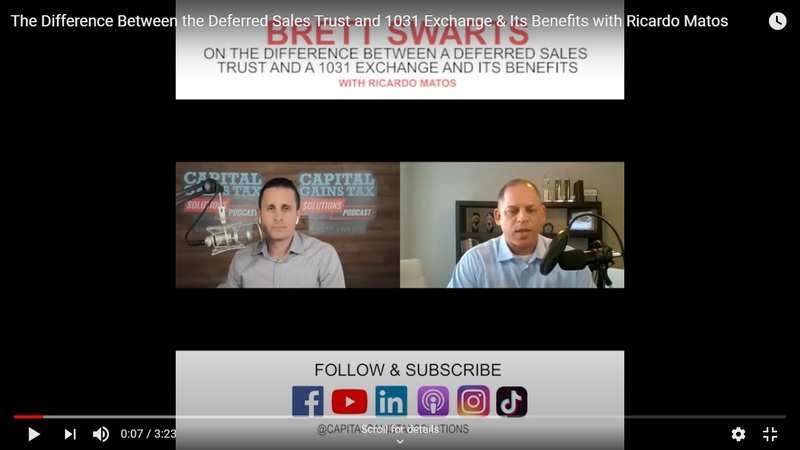
Ricardo Matos:
Can you elaborate, for our listeners, what a 1031 is? If it fails, what is the difference and what is the benefit behind it?
Brett Swarts:
Great question. So 1031 is part of that first category, blockbuster or transactional exit planning. It's not really even an exit plan. It's more of a continuity strategy where you're selling like kinda investment, real estate, for another lifetime investment, real estate, or a business for like kind of business. Although most business owners I meet, never do 1031s with business because there's just too complicated, okay. But essentially, you can sell something you can defer tax. Here are the challenges with the 1031. This is why it's a transactional tax deferral strategy versus transformational. I call it the shotgun wedding recording here we have those friends who got married real fast, they met somebody who fell in love within 45 days, got engaged, and got married in 180 days, I have those friends. Some of those marriages don't work out so well, right, because it's like this forced shotgun quick decisions. And that's what 1031 forces you to do. You see, you have to identify within 45 days, that like-kind property you're going to buy you have to get engaged to it, put it on your list, and then you have to close on it and marry it within 180 days. Not good Ricardo, our parents taught us to sell high and buy low. They teach you to sell high and shotgun weddings into 180-day later deal, right. That's what happened in ‘06, ‘05, people were doing the shotgun weddings, overpaying for properties. Some of them lost everything. So I was going through my journey of trying to survive and making the business. My clients were also going through a similar journey just trying to hold on to what they had made, not to the banks. And the number one thing we identified as the biggest challenge to this was the capital gains tax. By the way, the 1031 because they were buying for equal or greater value. With more debt. They felt trapped Ricardo they didn't want to buy they knew it was a seller's market into the deferred sales, trust Netflix, you can park the funds on the sidelines and wait for as long as you want.
You never have to buy real estate ever again, Ricardo, if you don't want to face the toilets, trash, and liability. In fact, you can put it in stocks, bonds, mutual funds, or other business ventures that someone else is managing and operating. You can wait and not have to have any debt. And that becomes transformational. Why? Because it frees up your time. And when time is your friend, guess what you can make better decisions. When time is not your friend. You're stuck swimming in what's called a Red Ocean. What's the red ocean, Ricardo? It's where all the sharks are famous for all the blood in the water to everyone's chasing all the jellyfish you want to be in the blue ocean, where it's calm, diversify, and the Caribbean where you know you're making a good deal and it's a good time to buy. Right? So with COVID-19, we think right now is the best time to sell, to get on the sidelines, to get out of debt to get diversified. Then just to be patient. Let all of the other chaos and madness go on and then buy when it makes sense for you. So, that's the power of the Deferred Sales Trust.
Learn more about Deferred Sales Trust
Visit: www.capitalgainstaxsolutions.com
 Post: Why People Haven't Heard of The DST As the First Choice
Post: Why People Haven't Heard of The DST As the First Choice
- Specialist
- SAINT AUGUSTINE
- Posts 261
- Votes 26
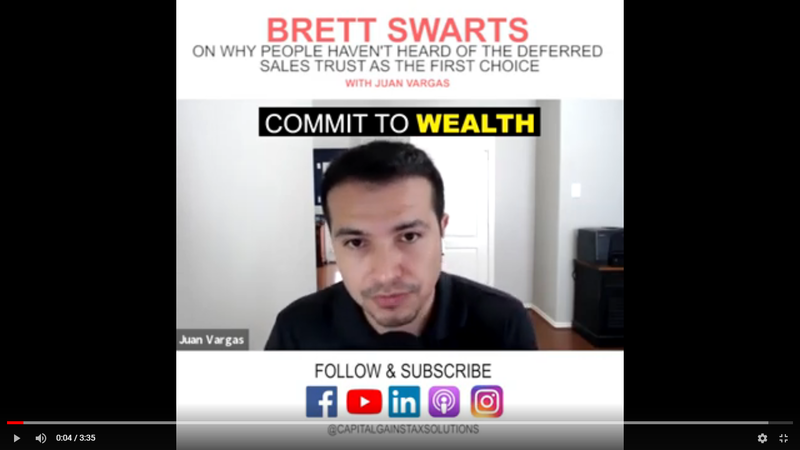
Juan Vargas:
Why people haven't heard of the Deferred Sales Trust as much as the 1031 exchange?
Brett Swarts:
Great question, Juan. So remember when I said I grew up in the real estate, and I've loved it all my life, and I invest, and if I told you about invest in multifamily senior housing and different things, so I love real estate, and I'm sure you and your listeners do too. But real estate is like a religion. By the way, I'm a part of that real estate religion. One of its doctrines is the 1031 and people are trained, and I guess the information that comes in from your broker, which, by the way, your broker doesn't want you to know about the Deferred Sales Trust. Why? Because that doesn't necessarily lead to more commissions for him, I'm speaking because I am a commercial real estate broker. So I remember those days, we loved having 1031 buyers, or sellers. Because it's like, the deals are gonna happen, we're gonna get a commission. So they don't necessarily want to tell you about the Deferred Sales Trust, where you could just be retired from all of that, and maybe not buy for 5 or 10 years. They want to keep you in 1031. Race if you will.
The second one is 1031 companies, they don't want you to know about it either, right? Because they make all their money on the 1031. If you go to a deferred sales trust, they're not holding the money. And that's where most of the education right now is in the commercial real estate world. That being said, the Marcus and Millichap, I've been in the San Francisco office, the Tampa office, we've been in the Denver office, the Orlando office, all these different offices to train folks. So there's not to say that those managers won't bring folks in. It's just the brokers are not getting paid to do deferred sales trust, they're getting paid to do 1031 exchange. So that's the first thing. The second thing is though, the other doctrine, by the way, is an installment sale. Both of them are used, are very well known. That's what we are, we're just adding manufactured installment sale, we're just creative on how we apply it. By the way, it's a proprietary structure that is protected. Part of it, why it's proprietary is one, we don't want the competition. But two, we also don't want it to fail. We don't anyone to abuse the structure and then it fails. Because it's not just the structure, it's the team, which executes the strategy. And that's basically my role, to work with the tax attorneys, to work with the financial advisor, to work with the commercial real estate broker, to get everyone in the room and basically say, how do we perfect and use this strategy to be as tax efficient.
So that being said, a lot of people think it's too good to be true, because they never heard of it. But we would also just counter that with the evidence, 1000s of closes now, over 24-year track record, you know, get to know us, bring in your trusted professionals and make sure that they ask us the tough questions. We've had 14 no change IRS audits. The biggest one was a $125 million dollar deal in San Diego as a commercial real estate sale. Not one single issue with the IRS. We've also had National Law Firm CPAs, we have 1000s of professionals who have signed up with us. We've done deals with Marcus and Millichap. We've done deals with Keller Williams, we've done deals with just about every title company. And we have exchange companies that work with us so the counter I guess the answer to sum it all up if you don't know about it, it's because you haven't talked to us yet. And that's really as simple as that.
Learn more about Deferred Sales Trust
Visit: www.capitalgainstaxsolutions.com
 Post: How Does The Deferred Sales Trust Work
Post: How Does The Deferred Sales Trust Work
- Specialist
- SAINT AUGUSTINE
- Posts 261
- Votes 26
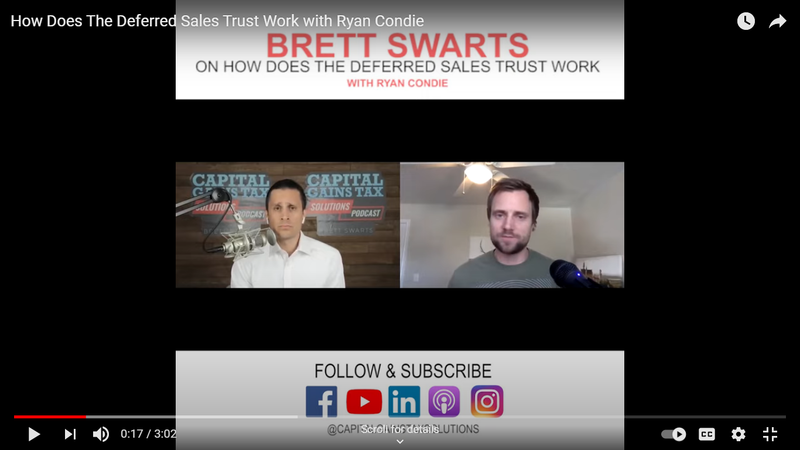
Ryan Condie:
So this is a perfect example. Let's keep going with this example here, Brett. So someone exits their business, they have a $2.5 million windfall. Most people think, oh, cool, that's a ton of money. And you know, but by the time all the taxman comes and kind of eats away at all these different fees, you got broker fees and lawyer fees, if you're not walking away from two and a half million bucks, especially with your tax burden, he said, the $600,000. So he's able to put, you know, say the 2.6 million minus some of the fees with brokerage and the transaction and stuff into like a separate account. And then what does that look like he has certain restrictions, can he invest in stocks, real estate, other businesses? How does that work in terms of the next steps for him?
Brett Swarts:
That's a great question. So the IRS gives these tax incentives they call legal tax loopholes to incentivize the money to keep working right. And so what they don't want to do is, you know, for example, you and I sell a business and just take our money to sit in the bank, right? Or just take it and just spend it on boats and cars, in our houses, because that doesn't necessarily incentivize the economy. And that's kind of cool for us, right? So what they say is, hey, we'll allow these legal loopholes as long as you put it into investments, investment purpose, such as stock market, right stocks, bonds, mutual funds, such as a real estate investment, real estate, such as a new business venture, why? Because that spurs economic growth, which in turn creates more jobs, which in turn actually creates more tax revenue. So it's a completely legal way to do this after 1000s of closes. Now 1920s tax law, originally known as a seller carry-back, we just perfected it for this niche for the deferred sales trust. So it's really flexible. And what's nice about it is you can either receive income or not receive income, you can invest it again in real estate or not in real estate. And you can use it as a kind of funding source for your next business venture. So it just all depends on what your wealth plan is and what your vision is. And oftentimes, it depends on what stage of life you're in. So some of our clients, their baby boomers, are right, and they're part of the largest wealth transfer in the history of the planet. And this is according to the American Bankers Association, that's about 17 to $20 trillion, that's going to pass and the next 20 years. In fact, there are about 10,000 baby boomers turning 65 every day, about 70. That's a lot. And there they're really struggling with toilets, trash liability employees, these businesses, they poured blood, sweat, and tears on for the last 20, 30, 40 years. But they didn't know how to get out without getting again hammered by that 30 to 50% capital gains tax. So we got to just kind of clarify your vision, look what you're trying to do, and then just do a mathematical equation. At the end of the day, as long as your deals at least a million or more net equity, and at least probably four to $500,000 again. Then you're looking at the deferred sales trust as I think is a real, real, solid viable option.
Learn more about Deferred Sales Trust:
Visit: www.capitalgainstaxsolutions.com
 Post: Difference Between 1031 Exchange And DST and The Pros And Cons
Post: Difference Between 1031 Exchange And DST and The Pros And Cons
- Specialist
- SAINT AUGUSTINE
- Posts 261
- Votes 26

Juan Vargas:
So tell me, what are the differences between a 1031 versus Deferred Sales Trust. Tell me the pros and cons because I know there are some pros to Deferred Sales Trust. But there are also some pros that we know about on a 1031. So why would I want to do Deferred Sales Trust, when I can simply 1031 that I already understand?
Brett Swarts:
Before we get there, I just want to touch on a little bit of the demographics and kind of the big problems. So we can focus on some of the details. So most commercial real estate owners, or business owners, or high-end primary homeowners, struggle with capital gains tax somewhere between 30 and 50% of their gain when they go to sell. So, we use the Deferred Sales Trust, which is a tax deferral strategy, get to tax deferral, liquidity diversification, that freedom, never has to go back and do a 1031 ever again, if you don't want to, all that so you can create and preserve more wealth. And so that's kind of defining the problem. And then let's define the demographics or what's happening right now and in the world. So according to the American Bankers Association, there's about 17 to $20 trillion that will pass from one generation to the next in the next 20 years. And this is known as the largest wealth transfer in the history of the planet. About 10,000 baby boomers are turning 65 every single day, and 77 million in the US alone. And they're challenged with toilets, trash, liability, a business a high-end primary home, they may have highly appreciated artwork or collectibles, and they're looking at 30 to 50% of their gain being wiped out, and they want to retire and they want to trade all of that headache and a lot of that wealth for not only tax deferral, but time, travel, liquidity, out of debt, and more preservation and more enjoyment of their wealth and also pass it to their kids in a good way where they don't get completely clobbered by the tax, but they feel trapped. And the reason they feel trapped is one, the 1031 exchange only works for investment property. I'll say that, again, the 1031 exchange only works for investment property. So that does not include the primary home, that doesn't include the business. We're doing a Bitcoin case or doing a horse case in Kentucky. We're doing artwork collectibles, car dealerships, dentists, veterinarians, the deferred sales trust covers all of those. So the first thing is defining the problem, and then figuring out what's a good solution for the client.
So let's dig in a little bit more into the 1031. Now, the 1031 exchange has a few shortcomings. The number one has to deal with what's called non-optimal timing, or what I like to call rushed forced buying situations where essentially, you sell high, let's imagine, and then you buy higher 180 days later. What did our parents teach us to do when we were young, they taught us to sell high and buy low, now not sell high and buy higher, 180 days later. So too often, we found with a lot of our clients, they felt rushed, they felt forced, they felt like they had no other alternative but to buy that property that otherwise they may not have bought, especially these last few years, and we're recording this during Corona. Now we're seeing a lot of similarities to the ‘08 crisis and what's happening now. I am concerned for those who overpaid and took on too much debt. That's what happened in ‘08, ‘05, ‘06, ‘07, people love to be sellers. They love to get that high price from that 1031 buyer, but they hate it to be buyers because they have to turn around and buy something within 180 days, and oftentimes overpay. We call it the candle burning about this. And the candle represents your return. If you can imagine a big candle, the bigger it is, the bigger the return. But what's burning on one side? Well, one side of what's burning is at cap rates are going lower and prices are going higher, not good. The other side that's burning is your time is running out, and as it burns, burns, burns, you get smaller and smaller returns. And then you're stuck with all the debt. So that being said, the first thing to understand is you don't want to buy optimal timing. And that's the intent, buy when it makes sense for you. But you also need to be able to do that tax-deferred and that's what the deferred sales trust enters. We can sell a property, defer the tax, pay off all the debt, move it into the trust, and once it's in the trust, we're no longer under the IRC 1031 we're under IRC 453 which has no timing requirement, has no light kind requirement, works for businesses, real estate, primary homes, and you can put it into securities if you want to, you can put into hard money lending, you can put it into real estate so that's the number one thing all tax-deferred. The second one is debt, which is not our friend won in a highly appreciated market meaning it's hard to find forced appreciation deals that make a lot of sense. rents have been driven up and cap rates are very low price per square foot is pretty high. That's not your friend to buy in that market you want to sell on that market, right?
But also you don't want to take on more debt when you do the 1031. So we like to call the Deferred Sales Trust, a debt-free plan for your commercial real estate or business because when you sell only, the proceeds need to go and we don't have to replace equal or greater value. So that's good.
I'll tell you a story we just closed last week, a gentleman was selling a $7.6 million multifamily property in Georgia. And he had about four and a half million dollars of debt. And he's done hundreds of transactions over his lifetime, and countless 1031 exchanges. But he sold right before the Corona crisis and in Corona hits. And all of his funds are sitting at the exchange accommodator. And he's concerned he doesn't want to overpay, he doesn't want to buy anything. And the prices were still pretty high for real estate. So what did he do? Well, for the first time in his adult life, he did a Deferred Sales Trust. And why did he do it? Because he didn't want to replace equal or greater value. So that debt replacements have gone, no debt, and he put the 3.1 million into the trust. So now he's debt-free. He's diversified, he's liquid and he's on the sidelines, all tax-deferred, right so that he could reduce his risk and also for him so he can retire. He's part of the baby boomers. He's just like, I live in California. I own the property in Georgia. I was thinking about buying in North Carolina like I just want to simplify my life. I've made enough wealth. I don't want to you know, get rid of it all and just pay the tax but I also want to retire and so that's where we're fill that gap. So I'll pause there, make sure you've caught that so far.
Learn more about Deferred Sales Trust
Visit: www.capitalgainstaxsolutions.com
 Post: Own Experience With The Deferred Sales Trust with Kyle Stanley
Post: Own Experience With The Deferred Sales Trust with Kyle Stanley
- Specialist
- SAINT AUGUSTINE
- Posts 261
- Votes 26
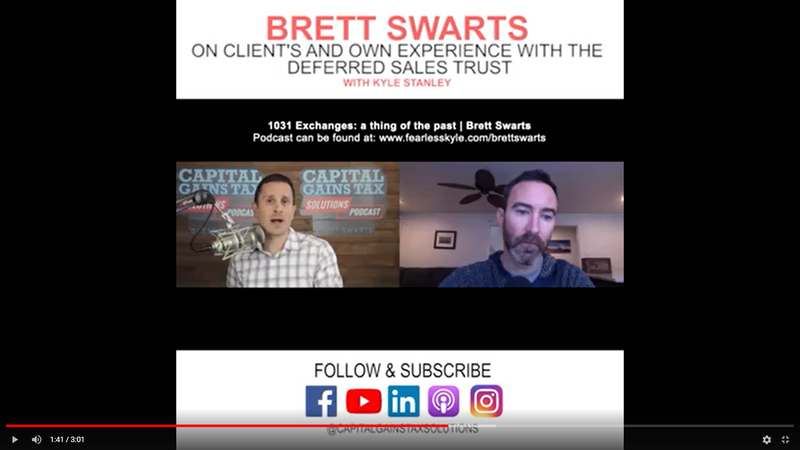
Kyle Stanley:
I love stories. So I want to hear a couple of stories and maybe some clients or maybe even some of your personal experience of what you use this for and some big ones.
Brett Swarts:
Yeah, talk about some deals that close recently. So here's the deal last week, it was a 50 unit multifamily property in Colorado. And it was for an older couple who was tired of the toilets, trash, and liability. Their net worth was very high, you know, over $20 million. And all of it's inside of their taxable state. So this is big for the deferred sales trust, not only do we solve their capital gains tax deferral challenges, not have to put them in other toilets, trash, and liability. They've made their wealth, they're ready to retire some time with the grandkids’ travel, not deal with the headaches. So we solved that. But then we moved all 5 million outside the taxable state would save them 40% on what's known as the debt tax. Okay, well, anyone who's married 22 million or more 12 million single, it's inside the tactical status hit with a 40% tax, well, those are set to go probably back half in 2025. Anyway, so we solve that challenge. Guess what, that broker is really happy because he sold the deal, right? Guess what, that buyer is happy because they sold the deal. There's a lot of people sitting there. And if you're listening or trying to buy deals for the first time, there are people that you want to buy, who do want to buy from the mom and pops who are tired, or like these clients who are ready for a change, who don't have a good solution. But when you can provide a solution to the problem, guess what, you're more likely to win that deal and maybe even get a discount, right? Because they don't have to pay all the tax, they can say, I can sell it for a fair value. Because I can defer the tax and you moved it outside my taxable estate. And guess what, you're a more attractive buyer versus everybody they're calling up and saying, I got this blockbuster 1031 thing do you want to do? And they're like, No, I've heard blockbuster forever. Right? I heard a blockbuster. And then he said, No, I got this Netflix thing. Tell me about the solution that you have for my problem. So as a buyer trying to attract sellers, you are in the job of not buying their property, you're in the job of solving their problem. When you do that, guess what? You win the deal. So that's the key for them. We did another one in and let's see in Palo Alto, the high-end primary home $8.3 million sales for a gentleman who was the number one Keller Williams agent in the entire company, multiple years and he's for his own house and he’s in the business for 30 years. Never seen this seemed too good to be true. I took your CPA we went through with them. It's true. It works. He did it. He just closed that one. So we can talk more and more about more deals. But I'll pause there to see if you any questions.
Learn more about Deferred Sales Trust
Visit: www.capitalgainstaxsolutions.com
 Post: Why Deferred Sales Trust Is Truly Like Netflix
Post: Why Deferred Sales Trust Is Truly Like Netflix
- Specialist
- SAINT AUGUSTINE
- Posts 261
- Votes 26
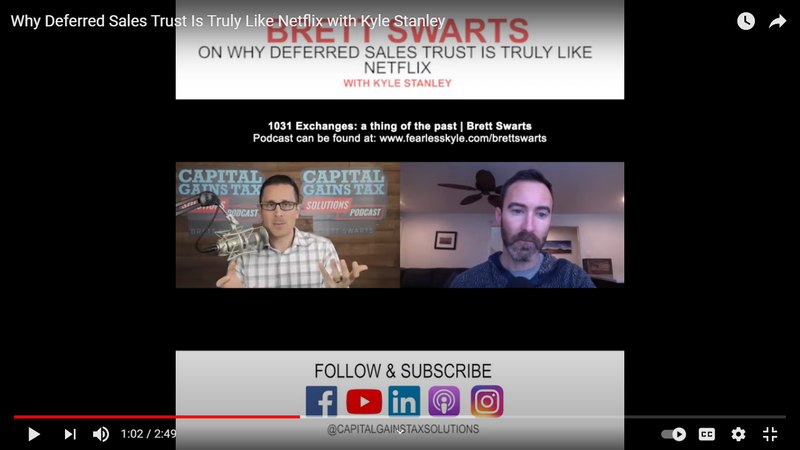
Kyle Stanley:
When we're talking about this, I guess the first thing that's coming to mind is, why is this truly like Netflix? Where it's like brand new? Or is this something that's been going on for a while that people just don't know about?
Brett Swarts:
That leads into my Three Secrets of the Optimal Timing Transformational Exit Plan. It's learning how to legally break free from the capital gains tax, find the freedom to buy and sell your business or property without ever worrying about a 1031 whenever again. So my story starts with Marcus and Millichap. I was sitting here saying too good to be true. How do I know this thing is legal? What's the track record, and this was 2009. This is right after the crash. So I had friends, family, clients who know someone lost everything. By the way, I was just a brand new broker, I was just barely making the business and my wife and daughter at home, and we're trying to survive. I don't know if you've ever been in a situation, Kyle, where you feel like you're not sure how you're going to be able to provide for your family. That's where I was at. It wasn't always easy. At the time, the market crashes. I went from a broker making a little bit to making next to none. So we had to get creative, and we had to try to solve problems. And so at the time, my manager at Marcus and Millichap brought in a gentleman who's now my business partner and the co-founder of the Deferred Sales Trust. He talked about this Deferred Sales Trust and like most folks, we said, how long is it been around? At the time, it had been around for about 12 years? How many audits, a few audits? How many deals, lots of deals.
Fast forward now, 1000s of closes billions under management last year alone, about 2 billion of actual gross volume of DST asset sales were sold. So, it's been around for a long time. Here's the key. Most people just don't know how to do it. They haven't done it like anything. It's always new or too good to be true until you have a guide who's a few steps ahead of you. It's gonna show you how to do it. It's the same thing with, self-directed IRAs, a self-directed 401k, or even a 1031 exchange 25 years ago. Now you have 5000 companies of 1031s all talking about it all the time. Guess what, there's just one group who's talking about the Deferred Sales Trust. That's the tax attorneys for my business partners. Some others are business partners, who are financial advisors who offer it for their particular one. For our role at Capital Gains Tax Solutions, we work directly with commercial real estate investors, brokers, syndicators, and we are the trustee to help close this. So it's still new until you meet someone who knows how to do it.
Learn more about Deferred Sales Trust
Visit: www.capitalgainstaxsolutions.com
 Post: More About Brett Swarts And The Deferred Sales Trust
Post: More About Brett Swarts And The Deferred Sales Trust
- Specialist
- SAINT AUGUSTINE
- Posts 261
- Votes 26
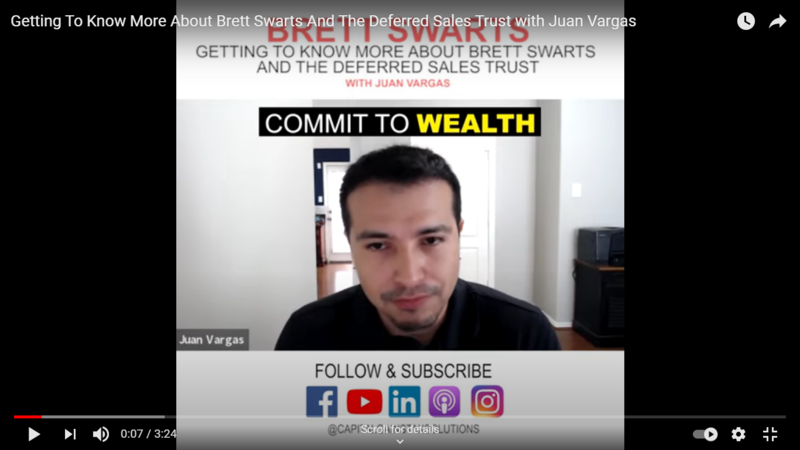
Juan Vargas:
A little bit more about your background and tell us more about the Deferred Sales Trust.
Brett Swarts:
Absolutely. So I fell in love with investment, real estate, and development at a young age in Northern California, helping my dad build homes, and he was an entrepreneur, businessman investor himself. And from there, I knew it was probably going to be in my future, somehow, some way. So I went to college, and I played basketball there. And I like working on teams and, and I had a mentor who played basketball. And he told me about a company called Marcus and Millichap. And so in 2006, I joined them as an internship and really kind of learning the basics of investment, real estate. And then I started my career full-time in investment, brokerage transactions in 2007. And just as I was getting the business going, the 2008 crisis hit, and I'm newly married, you know, baby on the way, and I did what every good entrepreneur does, and figured out a way to keep the dream alive. As a new dad, and as a husband, I'm trying to provide for the family. And, and so how do I keep it going? And how do I make it work? And, it's tough, right? It's really easy. It's like every entrepreneur’s journey is a little bit challenging. And so I went, and not only tried to learn more about ways to add value to clients, and kind of survive in the business. But also, I wanted to help my clients who had friends and family, who lost everything in the ’08 crash. Part of why they lost everything is because they had too much debt. And they felt forced and pressure to overpay for properties via 1031 exchange. And so along this journey, I'm trying to make it in the business because of the 100% commission, I'm working side jobs and in restaurant jobs at night, and my manager brought in a gentleman to speak on this strategy called a Deferred Sales Trust. And it's like you never have those moments when the light bulb goes off in your head and you're like, there's a whole nother world out there that I wasn't even aware of. That began my journey of tax deferral and helping my clients escape, feeling trapped by capital gains tax and the 1031 exchange so they can create and preserve more wealth.
So, I set out on the plan to educate all of them and to become an expert in tax deferral and alternatives to 1031 exchanges. That's why I've done Delaware Statutory Trust, I've done Deferred Sales Trust and 1031 exchanges and, and fast forward over 10 years of studying and working with individual clients. We've now launched Capital Gains Tax Solutions to help every business professional out there, whether it's commercial real estate brokers who were like me, or financial advisors, or Business Brokers, high-end realtors, and our goal is to equip them with the strategy and of course the high net worth individual, all so that they business professional can grow their business and help their clients escape feeling trapped by capital gains tax.
Learn more about Deferred Sales Trust
Visit: www.capitalgainstaxsolutions.com
 Post: Why Would Someone Want To Get Away From The 1031
Post: Why Would Someone Want To Get Away From The 1031
- Specialist
- SAINT AUGUSTINE
- Posts 261
- Votes 26

Kyle Stanley:
So getting away from the 1031, why would someone want to get away from the 1031?
Brett Swarts:
Let's talk about the demographics going on right now. It's according to American Bankers Association is about 17 to $20 trillion, it'll pass from one generation to the next in the next 20 years. This is our parents’ cow. This is known as the largest wealth transfer in the history of the planet. In fact, there are about 10,000 baby boomers in the US alone. Every day, I'm sorry, 10,000, turning 65 every day, and there's about 77 million in the US alone. They’re faced with this huge liability of tax from these highly appreciated assets. Most of them have been then 1031 exchange, right? That's been their mode and method of deferring tax on commercial real estate, the recent tax plan even before buying what he's proposing to take it away, years with Trump, they limited it just to investment real estate. So you have high in primary homes, invest in real estate, highly appreciated public stock, and also exchange deals that are hard to find deals. So what's happening is, it's tough to even use 1031, when the 1031 only works for investment, real estate. So we want to provide a solution what's called the Deferred Sales Trust. We liken it to blockbuster versus Netflix blockbusters, the old way of doing things, this thing called Netflix, and it's a bit much easier way to do things and a better outcome for everybody.
Learn more about Deferred Sales Trust
Visit: www.capitalgainstaxsolutions.com




